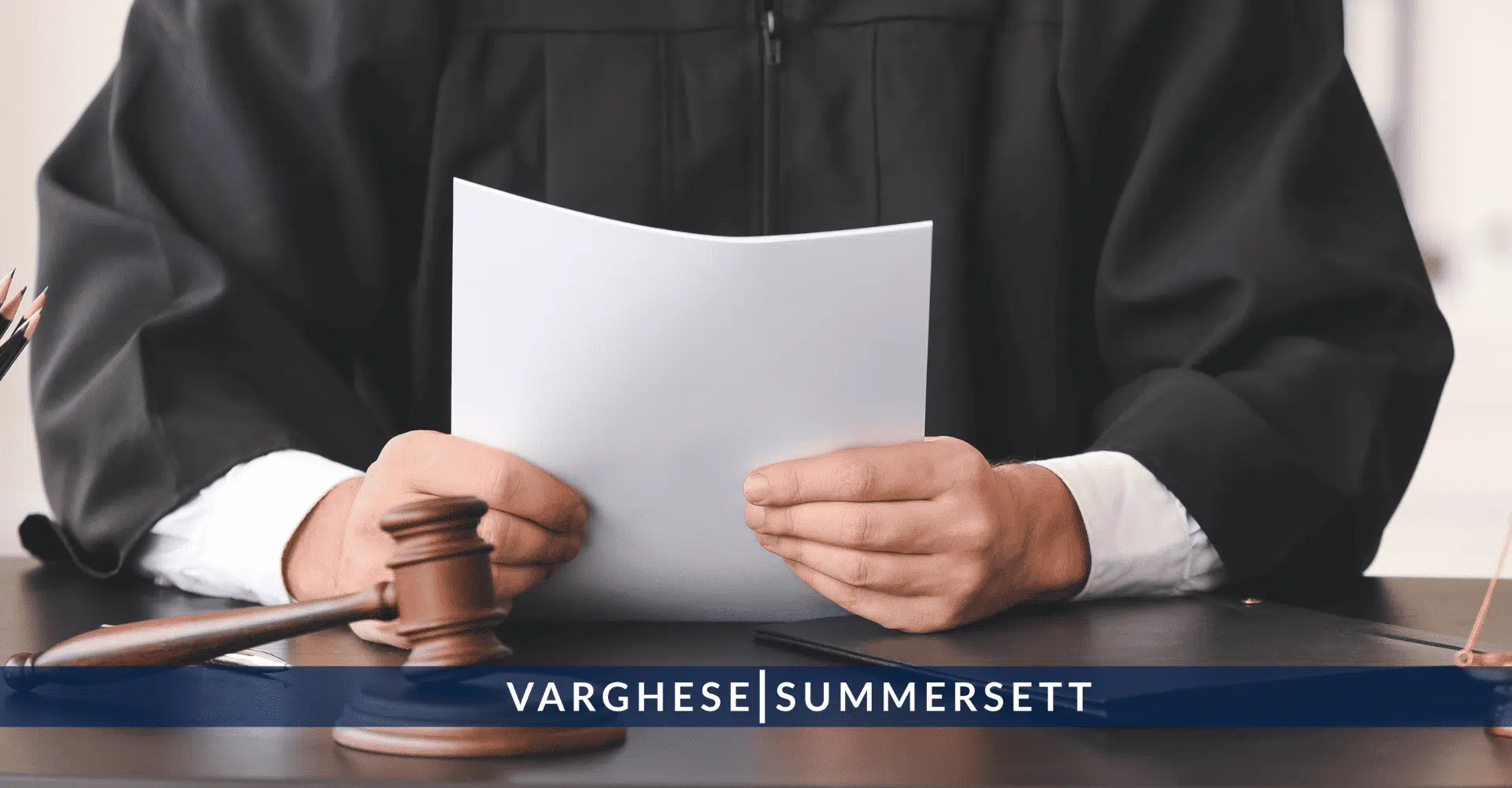Dallas Probation Violation Lawyer | Probation Revocation Attorney
Dallas Probation Violation Lawyer Serving Dallas and Surrounding Counties
Is the State alleging you violated probation? Maybe it was a simple mistake or a momentary lapse in judgment. Regardless, your freedom may be in jeopardy. The best thing you can do is get out in front of it by contacting an experienced Dallas probation lawyer as soon as possible.
At Varghese Summersett, we have successfully defended dozens of clients accused of violating their probation. We know how to navigate the probation system, and we will do everything in our power to get you back on track and on with your life.
In this blog post, our team of experienced criminal attorneys will explain common probation violations and possible ramifications for breaking the rules, and answer frequently asked questions.
What is a probation violation?
When people are put on probation or deferred adjudication probation, they are essentially given a second chance. In exchange for not going to jail or prison, they agree to follow certain rules set forth by the court. These conditions are typically designed to help the offender rehabilitate and become a productive member of society.
However, probation is still a form of punishment, and if you violate the terms of your probation, you may be subject to harsher penalties, including jail time.
What are common probation violations in Dallas?
A probation violation can be any number of things, but some of the most common include:
- Missing a meeting with your probation officer
- Failing a drug test
- Failing to complete court-ordered community service
- Failing to pay court fines or restitution
- Traveling out of state without prior approval from your probation officer
- Getting arrested for a new crime
- Associating with known criminals

What happens if you violate a condition of your probation in Dallas?
When a probationer fails to comply with the conditions of their probation (straight probation or deferred adjudication probation), their probation officer can give them a warning, ask the judge for sanctions, or file a motion with the court to revoke or adjudicate their probation.
If you are facing a probation violation, contact a skilled Dallas probation violation lawyer as soon as possible. Our team at Varghese Summersett will review the circumstances of the alleged violation(s) and explain your legal options moving forward.
What are probation sanctions?
Probation sanctions are punishments that can be imposed on a probationer for violating the terms of their probation. For example, if someone misses a meeting with their probation officer, they may be given a sanction, such as a weekend in jail. Oftentimes, probationers are given several sanctions before a motion to revoke their probation is filed – unless they are arrested on a new charge in which case a motion to revoke is almost always immediately filed.
Common probation sanctions include:
- Requiring the offender to serve time in jail
- Extending the length of probation
- Imposing additional conditions on probation (i.e., drug testing, community service, etc.)
- Suspending driving privileges
- Requiring the offender to attend counseling or treatment
If you have been accused of violating your probation, it is important to speak with a Dallas probation violation attorney as soon as possible. The sooner you take action, the better your chances will be of minimizing the consequences.
What is a motion to revoke probation?
If a defendant is on straight probation and the probation officer believes he or she has violated the conditions of probation, the officer has the discretion to file a “motion to revoke” probation which is also signed by the prosecutor. The motion – which states the specific violations for which the defendant is accused – will then be presented to a judge.
If the judge grants the motion, a warrant will be issued, the probationer will be taken into custody and a revocation hearing will be scheduled. At the hearing, the offender will have an opportunity to present evidence and witnesses on their behalf. The judge will then decide whether or not to revoke the probation and send the offender to jail or prison.
What is a motion to adjudicate probation?
If a defendant is on deferred adjudication probation (as opposed to “straight probation”) and the probation officer believes he or she violated their conditions of probation, the officer will file a “motion to adjudicate” which is also signed by the prosecutor.
This motion is necessary because a defendant who is on deferred adjudication was never found guilty of the offense. In other words, the judge set aside any finding of guilt.
A motion to adjudicate asks the court to now find the defendant guilty and determine what punishment is appropriate. These are usually two-part hearings in which the violations are first established and then the court decides the punishment.
What happens during a probation revocation hearing?
During a probation revocation hearing, the prosecutor will present evidence to the judge showing that the defendant violated the terms of their probation. The defendant, through their attorney, will then have an opportunity to present evidence and witnesses on their behalf.
At the conclusion of the hearing, the judge basically has three options:
- revoke the probation and send the offender to jail or prison,
- continue the probation with or without modifying the terms, or
- take no action.
If you are facing a probation revocation hearing, it is important that you have an experienced Dallas probation violation attorney by your side who can help you protect your rights and fight for your freedom.
What is the burden of proof in a motion to revoke or adjudicate probation?
In a motion to revoke or adjudicate probation, the state does not have to prove the defendant’s guilt “beyond a reasonable doubt.” Instead, the burden of proof is much lower. The state must show that it is more likely than not that the defendant violated their conditions of probation.
That’s why it’s imperative to have an experienced Dallas probation violation lawyer fighting on your behalf. The stakes are very high in probation violation hearings, as your liberty is on the line.
What is the punishment if your probation is revoked?
If you are on deferred adjudication probation, the court can consider the entire range of punishment for the underlying offense. For example, if you are on probation for second-degree felony, which is punishable by 2 to 20 years in prison, you could face up to 20 years in prison. The judge will choose the sentence.
If you are on straight probation, the judge is limited in the sentence they can impose. For example, if you received a five-year sentence probated for 10 years, the judge is limited to a five-year sentence.
Can a plea bargain be reached for a probation revocation?
Yes, in some cases it may be possible for your Dallas probation violation lawyer to work out a plea agreement with the prosecutor before the hearing. This would avoid the need for a hearing altogether.
The agreement would likely involve the defendant pleading guilty to the violation in exchange for a sentence of probation or a short amount of time in jail.
It is important to have an experienced attorney by your side who knows how to negotiate with prosecutors and get the best possible outcome for you.
Contact a Dallas probation violation lawyer today.
 Don’t risk going back to jail or prison because of a probation violation – call Varghese Summersett today at 214-903-4000 to schedule a free consultation with a Dallas probation violation lawyer. We will thoroughly review the facts of your case and develop an aggressive defense strategy designed to protect your freedom.
Don’t risk going back to jail or prison because of a probation violation – call Varghese Summersett today at 214-903-4000 to schedule a free consultation with a Dallas probation violation lawyer. We will thoroughly review the facts of your case and develop an aggressive defense strategy designed to protect your freedom.

